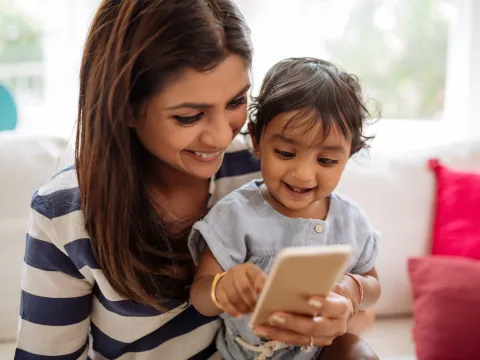- AdventHealth

Let's face it: smartphones can be downright addictive. With the whole Internet just a click away, its no wonder kids and teens are tempted to scroll from sun up to sundown. But how much is too much?
A new report reveals that the amount of time kids spend on their mobile screens has tripled in the last four years. On average, children eight and under spend more time on their phones than they do reading or being read to. The average time per day spent looking at various screen media? Two hours and 19 minutes, with 35 percent of that taking place on mobile devices.
Kids are picking up smartphones faster than researchers can create usage guidelines, but virtually all of them agree on one thing: more screen time means more problems for young brains. Some scientists are even drawing a link between smartphone use and surging rates of teen depression and suicide.
AdventHealth Orlando pediatrician Analise Casey, MD, joined us to talk about what's at stake, and what parents can do, when it comes to kids and smartphones.
Q: How much is too much screen time for kids and teens?
A: It depends on the age. Under two years of age we recommend no screen time, including TV, computers, video games and smartphones. For children over two, some screen time is okay, but no longer than two hours per day. It's better for them to be out experiencing the world, playing. They can learn so much more that way.
However, we find that children are spending significantly more time than what we recommend when you factor in the collective time on phones, TV and computers.
Q: Why is screen time not recommended at all up to age 2?
A: Screens are not good for the developing brain in infants and children under two years old. It's better for them to be engaged with more social and hands-on learning opportunities.
It's not that screens are dangerous, it's just not the best way for someone under age two to be spending time. Time reading, playing with toys, interacting with parents, family and other children is healthier for overall development.
Q: Is it okay to use screens when you're in a pinch, like in a waiting room or on a long airplane ride?
A: We all do that, and sometimes screens can help calm a child down and distract them. But there are times that you want to avoid using screens for this reason, because children learn these associations. For example, try to avoid using screens if you're going out to dinner, and find another way to engage your child, such as drawing, playing a game at the table or talking to them about their day or meal.
If you are going on a long trip, it's okay to use some screens to help the time pass, but they should be seen as a privilege and not the norm. When it comes to temper tantrums or undesirable behaviors, don't use screens to calm a child down. This sends a message to them that they are being rewarded for that behavior.
Q: How do you know if it's affecting your child?
A: Too much screen time, especially too close to bedtime, can cause difficulty falling asleep. If you notice disruptions in sleep patterns, or nightmares, it could be a clue.
[Smartphones] can also create stress, affect mood and increase risks for depression and sadness. This is because too much screen time can cut off your interaction with the outside world and your social relationships, which help protect you from anxiety, depression and sadness. In children, social activities are critical for healthy development.
Along those lines, if your child is moving from one screen to the next, this doesn't help in promoting healthy attention and focus to an activity. So, for children with attention disorders such as ADHD, screen time is especially important to monitor.
Dr. Caseys Tips for Parents
A little discipline can go a long way in nurturing positive screen behaviors in kids. Here is Dr. Caseys advice for setting boundaries in your home.
1. Make Bedrooms a Screen-Free Zone
I often speak to parents about whether or not there is a TV in their child's room; I recommend not having one. Keep screens in family areas where there is more supervision and accountability. If kids have screens in their rooms, they tend to watch them a lot more, and even right before bed, which can disrupt sleep.
It's also a good idea to have phones and devices charging in the kitchen or family room (not in bedrooms). Set a time at night when all devices are plugged in and off for the day. Keep kids rooms a safe place to sleep and relax.
2. Check Your Own Screen Usage
Children model after us, so be mindful about picking up your phones all of the time or endlessly scrolling through your social media feeds during family time. It's important to regulate ourselves, including how much and when we are using technology. Children think it's okay if they see us doing it.
While [social media] is a great opportunity to keep in touch with family and friends, if you are sharing photos of your children, make sure that you do so safely and with your privacy settings to your comfort level.
3. Keep Screen Activities Age-Appropriate
Know what games your children are playing and what they are viewing to make sure the content is age-appropriate. Technology makes so many things very accessible. I have seen some children experience nightmares over something they just briefly saw from a social media or web search.
Talk to your children about how to keep screen time safe and within boundaries. And if you have any questions about screen time, don't hesitate to talk to your child's pediatrician.
If you'd like more information about regulating your child's screen time, you can schedule an appointment with Dr. Analise Casey by calling the AdventHealth Medical Group, Lake Mary Pediatrics, at Call407-323-3550.



